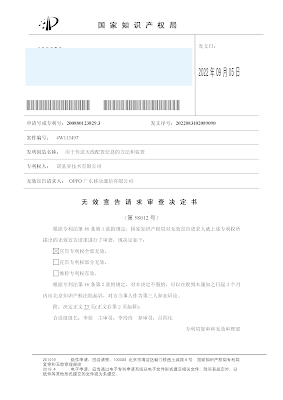A spokeswoman for the Munich I Regional Court has confirmed that a Nokia v. OPPO patent infringement action (case no. 21 O 8880/21) has been stayed by the court's 21st Civil Chamber (Presiding Judge: Dr. Georg Werner) pending the parallel nullity proceeding in the Federal Patent Court. The opposition period at the EPO expired for this patent shortly before Nokia sued OPPO, so it had to be challenged by means of a nullity complaint.
The patent-in-suit is EP3396868 on a "method and apparatus for conveying antenna configuration information" and its validity appears to be in doubt.
In October 2021, I noticed that one of Nokia's Indonesian patents-in-suit is from the same family. That Indonesian case was dismissed by the lower court, and this month it became known that Indonesia's Supreme Court threw out Nokia's appeals.
The same European patent is also being asserted in The Hague as my Nokia-OPPO battlemap showed.
Furthermore, a Chinese patent from the same family has already been invalidated as the following screenshot shows (click on the image to enlarge):
If one counts two of Nokia's German patents-in-suit as one because they are from the same family, the current "score" is that
7 cases got stayed (most of them in Dusseldorf),
2 resulted in a finding of no infringement, and
4 led to injunctions.
Patent litigation is a "you win some, you lose some" business, and some of OPPO's countersuit patents are under invalidation pressure from Nokia. But Nokia is the one who started it, and seeks to be the net licensor. There is a Chinese FRAND rate-setting process underway, and the "hit rate" (of course, not counting non-standard-essential patents) may also be taken into consideration by the Chongqing court in its determination. It would not be an unreasonable assumption that Nokia picked patents for litigation purposes that it deemed particularly strong.
Nokia got better news on another front this month: the renewal of its patent license agreement with Samsung without litigation. But OPPO is not Samsung, and the question is whether Nokia is sufficiently flexible so the parties can finally come to an agreement. For now it seems they need more guidance from the courts.
